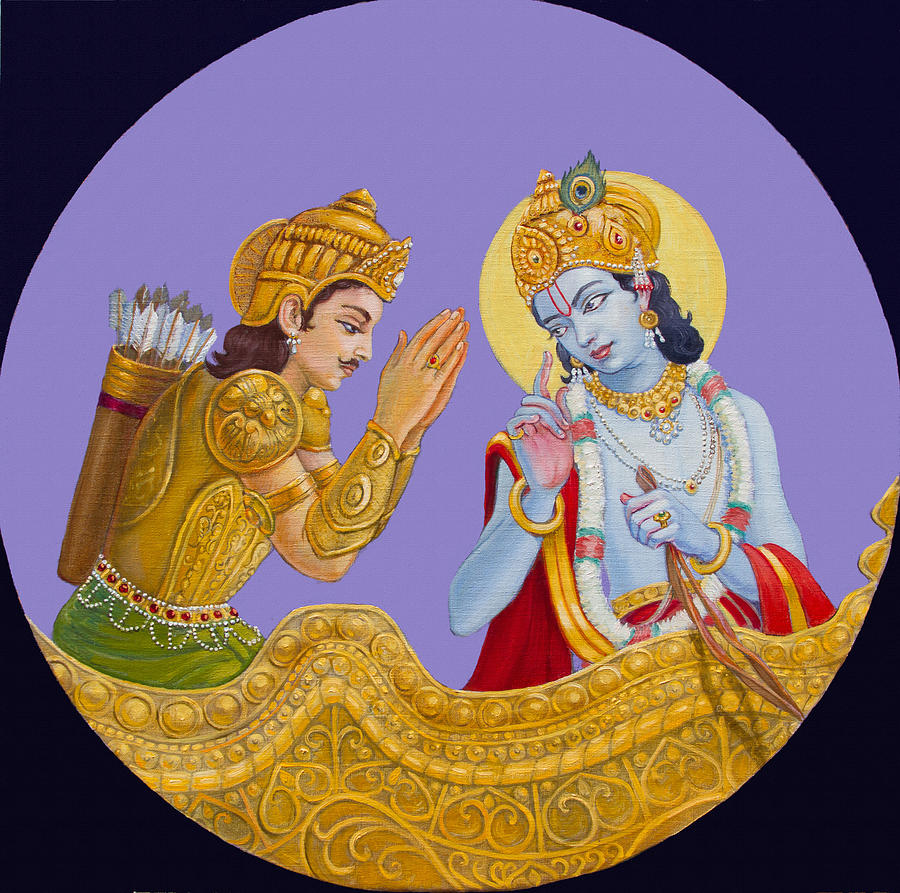GEET: THE SONG
ETERNAL
"I am a
running river
of eternity
fragmented for a purpose divine.
fragmented for a purpose divine.
I am the sun,
The moon, I
I am all the stars that shine.
The moon, I
I am all the stars that shine.
Every thing is
a
radiant being
drenched in a halo sublime
radiant being
drenched in a halo sublime
Throw your lot
in
O Poet!
Come, join the melodious rhyme"
O Poet!
Come, join the melodious rhyme"
 Krishna Speaks the Bhagavad-gita -- Dominique Amendola
Krishna Speaks the Bhagavad-gita -- Dominique Amendola
The Bhagavad Gita ("Song of the Lord," often referred to as simply the “Gita” or “Geet”) consists of the 700 verses that comprise chapters 23–40 of the 6th book of the “Mahabharata,” traditionally authored by one of the poem’s characters, Vyasa (Sanskrit for “Compiler”), the son of Parashara (who had composed the first purana, the ‘Vishnu Purana”) but actually the immortal avatar of Vishnu brought into being to make all the Vedic knowledge available in written form. Via his deceased brother’s wives Vyasa was also the father of the warring factions in the “Mahabharata,” and through his own wife the father of Shuka, the main narrator of the “Bhagavata Purana,” which proclaimed itself as the essence of all the Upanishads and is particularly important in Indian religious literature for its emphasis on the practice of devotion as compared to the more theoretical approach of the Gita. The epic recounts the events of the Kurukshetra War, as related by Sanjaya, who had been granted the ability to see distant occurrences by Vyasa himself; the Bhagavad Gita portion is set in the narrative framework of a dialogue between the Pandava prince Arjuna and his guide and charioteer Krishna, another of Vishnu’s avatars. Arjuna was reluctant to do battle against his own relatives, friends, and teachers, but Krishna explained his duties as a warrior and prince while elaborating on a variety of philosophical concepts that form the core of Hinduism, especially a new emphasis on devotion. It is part of the Prasthanatrayi (the “three sources”), which also include the dozen or so Upanishads and the Brahma sutras by the sage Badarayana (who is called Vyasa in some texts) which systemizes and summarizes the various texts. Mohandas Karamchand Gandhi claimed, “When doubts haunt me, when disappointments stare me in the face, and I see not one ray of hope on the horizon, I turn to Bhagavad-Gita and find a verse to comfort me; and I immediately begin to smile in the midst of overwhelming sorrow. My life has been full of external tragedies and if they have not left any visible or invisible effect on me, I owe it to the teaching of the Bhagavad Gita.” According to Khushwant Singh, Rudyard Kipling’s poem “If” represents the "the essence of the message of The Gita in English":
ReplyDeleteIf you can keep your head when all about you
Are losing theirs and blaming it on you,
If you can trust yourself when all men doubt you,
But make allowance for their doubting too;
If you can wait and not be tired by waiting,
Or being lied about, don’t deal in lies,
Or being hated, don’t give way to hating,
And yet don’t look too good, nor talk too wise:
If you can dream—and not make dreams your master;
If you can think—and not make thoughts your aim;
If you can meet with Triumph and Disaster
And treat those two impostors just the same;
If you can bear to hear the truth you’ve spoken
Twisted by knaves to make a trap for fools,
Or watch the things you gave your life to, broken,
And stoop and build ’em up with worn-out tools:
If you can make one heap of all your winnings
And risk it on one turn of pitch-and-toss,
And lose, and start again at your beginnings
And never breathe a word about your loss;
If you can force your heart and nerve and sinew
To serve your turn long after they are gone,
And so hold on when there is nothing in you
Except the Will which says to them: ‘Hold on!’
If you can talk with crowds and keep your virtue,
Or walk with Kings—nor lose the common touch,
If neither foes nor loving friends can hurt you,
If all men count with you, but none too much;
If you can fill the unforgiving minute
With sixty seconds’ worth of distance run,
Yours is the Earth and everything that’s in it,
And—which is more—you’ll be a Man, my son!